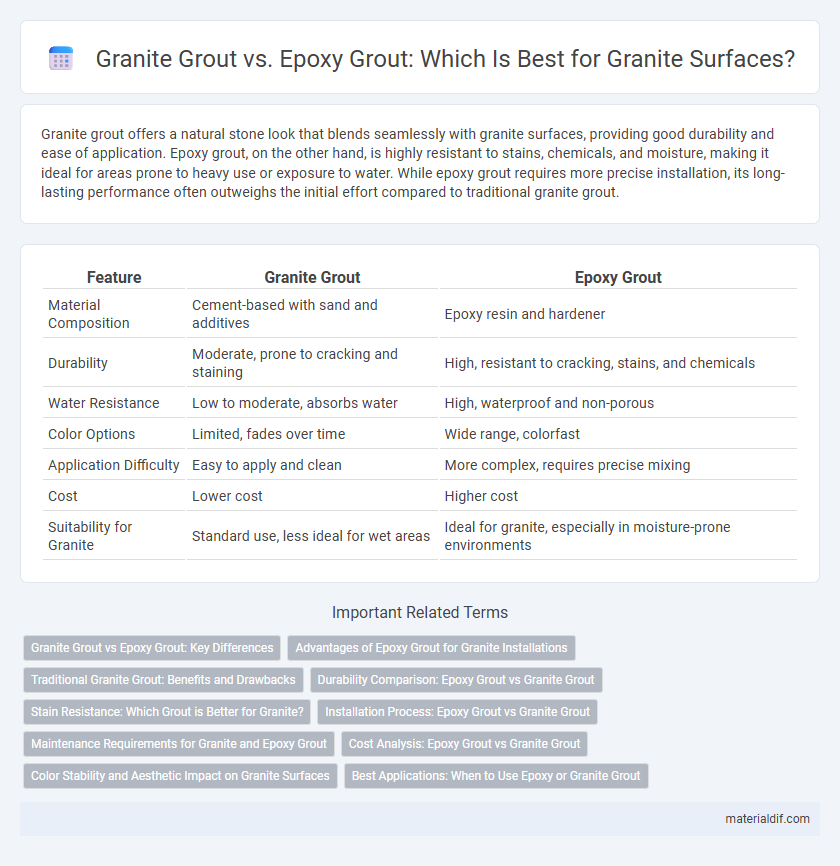Granite grout offers a natural stone look that blends seamlessly with granite surfaces, providing good durability and ease of application. Epoxy grout, on the other hand, is highly resistant to stains, chemicals, and moisture, making it ideal for areas prone to heavy use or exposure to water. While epoxy grout requires more precise installation, its long-lasting performance often outweighs the initial effort compared to traditional granite grout.
Table of Comparison
| Feature | Granite Grout | Epoxy Grout |
|---|---|---|
| Material Composition | Cement-based with sand and additives | Epoxy resin and hardener |
| Durability | Moderate, prone to cracking and staining | High, resistant to cracking, stains, and chemicals |
| Water Resistance | Low to moderate, absorbs water | High, waterproof and non-porous |
| Color Options | Limited, fades over time | Wide range, colorfast |
| Application Difficulty | Easy to apply and clean | More complex, requires precise mixing |
| Cost | Lower cost | Higher cost |
| Suitability for Granite | Standard use, less ideal for wet areas | Ideal for granite, especially in moisture-prone environments |
Granite Grout vs Epoxy Grout: Key Differences
Granite grout typically consists of cement-based materials that provide a natural look and are more porous, making them susceptible to staining and requiring regular sealing. Epoxy grout is composed of epoxy resins and a filler powder, offering superior resistance to stains, chemicals, and water, resulting in a more durable and low-maintenance option. The choice between granite grout and epoxy grout hinges on factors like application environment, desired durability, maintenance frequency, and aesthetic preferences.
Advantages of Epoxy Grout for Granite Installations
Epoxy grout offers superior stain resistance and durability compared to traditional cement-based grout, making it ideal for granite installations exposed to moisture and heavy use. Its non-porous nature prevents water absorption and resists mold and mildew growth, ensuring long-lasting integrity of granite surfaces. The chemical resistance of epoxy grout also protects granite countertops from acidic substances and household cleaners, preserving their polished appearance.
Traditional Granite Grout: Benefits and Drawbacks
Traditional granite grout offers excellent porosity that allows natural stone to breathe, reducing the risk of moisture buildup under the surface. It is easier to apply and repair compared to epoxy grout, making it a cost-effective choice for many granite installations. However, its susceptibility to staining and cracking due to water absorption requires regular sealing and maintenance to preserve the granite's appearance.
Durability Comparison: Epoxy Grout vs Granite Grout
Epoxy grout exhibits superior durability compared to granite grout due to its enhanced resistance to stains, chemicals, and cracking. Granite grout, while durable, is more porous and susceptible to wear and discoloration over time. For long-lasting performance in high-traffic or moisture-prone areas, epoxy grout remains the preferred choice.
Stain Resistance: Which Grout is Better for Granite?
Epoxy grout offers superior stain resistance compared to traditional granite grout due to its non-porous and chemically resistant properties, making it ideal for high-traffic or moisture-prone areas. Granite grout, typically cement-based, is more porous and requires sealants to prevent staining from oils, spills, or acidic substances often encountered in kitchen settings. For long-term durability and minimal maintenance on granite surfaces, epoxy grout provides a more effective stain-resistant solution.
Installation Process: Epoxy Grout vs Granite Grout
Epoxy grout requires a more meticulous installation process, involving precise mixing of resin and hardener before application to ensure durability and stain resistance, ideal for granite surfaces. Granite grout, typically cement-based, is easier to install but demands careful sealing to prevent moisture penetration and staining. Epoxy grout's longer curing time and chemical resistance make it preferable for high-traffic granite installations, while granite grout suits low-maintenance projects.
Maintenance Requirements for Granite and Epoxy Grout
Granite grout requires regular sealing to prevent staining and maintain its durability, as it is more porous and susceptible to water absorption. Epoxy grout offers superior resistance to stains, chemicals, and moisture, significantly reducing the need for frequent maintenance and sealing. Both types benefit from routine cleaning, but epoxy grout's non-porous nature makes it especially low-maintenance compared to traditional granite grout.
Cost Analysis: Epoxy Grout vs Granite Grout
Granite grout typically costs between $3 to $8 per square foot, making it a more budget-friendly option compared to epoxy grout, which ranges from $8 to $15 per square foot due to its enhanced durability and stain resistance. Epoxy grout's higher price point is justified by its superior resistance to cracking, chemical stains, and moisture penetration, which extends the lifespan of granite installations. For large-scale projects, the upfront savings of granite grout may be outweighed by the long-term maintenance costs avoided through epoxy grout's robust performance.
Color Stability and Aesthetic Impact on Granite Surfaces
Granite grout offers excellent color stability that complements the natural hues of granite, ensuring a consistent and harmonious appearance over time. Epoxy grout provides superior resistance to stains and discoloration, maintaining a vibrant and uniform look that enhances the aesthetic impact of granite surfaces. Choosing between grout types depends on desired durability and the long-term color retention to preserve the granite's natural beauty.
Best Applications: When to Use Epoxy or Granite Grout
Epoxy grout is ideal for high-traffic areas and wet environments such as kitchens and bathrooms due to its superior stain resistance and durability. Granite grout, typically cement-based, is best suited for dry, low-traffic spaces and requires sealing to prevent moisture absorption. Choosing epoxy grout enhances longevity and maintenance efficiency, while granite grout offers cost-effectiveness and easier installation for less demanding applications.
Granite Grout vs Epoxy Grout Infographic

 materialdif.com
materialdif.com